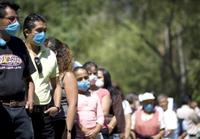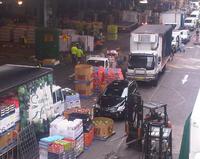-
Information sharing seen as public health "game changer"

Public health officials are pushing for the creation of shared databases that contain electronic health records (EHRs) to help combat infectious diseases and stop epidemics; a CDC official pointed to the positive impact that electronic health information exchanges (HIE) have on public health; during the 2003 SARS outbreak, Milwaukee helped establish a four-state network that automatically detected new cases of SARS based on electronic reports from local hospital emergency rooms; manual reporting of test results is a slow process, but with the use of electronic reporting public health officials can now quickly identify epidemics and pandemics as they occur
-
-
Drug resistant salmonella found in recalled turkey burgers

Last week the Centers for Disease Control and Prevention (CDC) announced that investigators have determined that ground Jennie-O turkey burgers have been contaminated with a drug resistant strain of Salmonella; the infection from the contaminated burgers was first detected on 27 December 2010 and has infected twelve people in ten states; a recall has been issued for nearly twenty-seven tons of the infected burgers; the Hadar strain of Salmonella, is resistant to most antibiotics complicating treatment options and increasing the chances of hospitalization; CDC investigators say they are still examining the case and may issue further recalls on raw turkey products
-
-
UN warns of potential food crisis
A UN Food and Agriculture Organization official warned that countries are not doing enough to increase food production to meet rising demand and that the world could be headed for a global food crisis; global food production must rise by 70 percent in order to meet the estimated demand for food; food prices have already soared in recent months and in 2010 food prices increased by 25 percent; rising prices sparked food riots in Egypt and Tunisia, which contributed to the overthrow of their governments; large disasters and droughts have significantly reduced crop yields across the world; as supply has fallen, demand has spiked due to population growth and increased use of food to manufacture biofuels
-
-
Border agents intercept "destructive" Pakistani insects in Oakland
The Khapra beetle, which is native to India, can eat its way through up to 70 percent of grain stores to which it has access; it was eradicated in the United States in 1966, and has been subject to federal quarantine since then; U.S. border agents in the Port of Oakland discover — and destroy — the larva in a shipment from Pakistan
-
-
Countries closely monitor Japanese food for radiation
On Saturday, Japan announced that radiation was detected in spinach and milk produced near the Fukushima nuclear plant; the levels were low enough to not pose a long-term threat to human health, but they were above the national safety level, so the Japanese government has stopped sales of food products from near the damaged plant; countries importing food products from Japan are on alert
-
-
Climate change linked to food safety, cost
Changing climate could make food more dangerous, add to the malnourishment of millions, and change even what we eat; for every degree the ambient temperature rises above 6 degrees Celsius — or 43 degrees F — temperature in an area, the occurrence of food-borne salmonella poisoning increases by 12 percent; drought can cause a loss in plant vigor, making plants more susceptible to disease; floods and heavy rains favor the growth of fungal pathogens on leaves, and many disease-causing organisms can spread in changing wind currents
-
-
Common clam to help clean oil-filled waters

Clams are bottom-dwelling filter feeders, obtaining nutrients by filtering the water around them; researchers at Southeastern Louisiana University are studying the lowly Rangia clam to determine whether the organism can contribute to helping clean oil-polluted waters
-
-
Drought in China threatens wheat crop and send global prices soaring

UN Food and Agriculture Organization (FAO) warned that a severe drought was threatening China’s wheat crop and could result in shortages of drinking water; analysts fear that wheat prices could soar even higher if China were to begin importing large quantities of food to feed more than a billion hungry mouths; wheat prices are already at record highs and have sparked food related protests around the world; surging prices are partially responsible for Egypt and Tunisia’s recent mass uprisings; China’s Shandong province, a major agricultural region, has only received fifteen percent of its normal rain levels; in dire terms Chinese state media reported that “land is drying out, and the crops are dying”
-
-
Curbing price speculation to prevent food riots
Global food prices are hitting record highs in part due to environmental disasters and increased financial speculation; to secure food supplies and prevent riots, agriculture ministers are proposing regulations on agricultural speculation; world food prices rose 25 percent last year while the price of grain has soared 79 percent; in 2008 sharp increases in food prices sparked riots and political instability in thirty countries including Egypt and Haiti
-
-
Technology tracks produce from growth to delivery

The new federal food safety bill has sparked a technology race among companies to provide simple electronic tracking systems for individual items of produce; the new law mandates that each part of the supply chain keep electronic records of where they received items from and where they shipped it to; this comes as a result of a large salmonella outbreak in 2008 that reached more than forty states and infected more than 1,300 people; poor records led to misidentification and slow recalls in that outbreak; every year 3,000 people die from food-borne illnesses while one in six people suffer from food poisoning
-
-
U.K. report warns of coming global food shortages
By 2050 global food supplies will not be sufficient to feed an expanding population; the UN estimates that food production must rise by 70 percent to feed a world population of more than nine billion in 2050; rising demand and surging global population coupled with increasing resource conflicts over land, water, and energy will hamper food production; currently nearly a billion suffer from hunger and more than sixty food riots have occurred in more than thirty countries in the last several years; the report urges an immediate action and whole range of government solutions to adjust current policies on economics, climate change, resource use, and agricultural practices
-
-
Mystery of 200 dead Wisconsin cows solved
Researchers find the cause of the mysterious deaths of 200 cows in Wisconsin: the sweet potato; the animals were killed by a poison found in spoiled sweet potatoes that were part of the cattle’s feed
-
-
FDA looks for ways to fund $1.4 billion Food Safety Reform Act
Food-borne illness strikes 40 million Americans, hospitalizing 100,000, and killing thousands each year; on 4 January President Obama signed the long-awaited FDA Food Safety and Modernization Act into law — sweeping legislation that overhauls U.S. food-safety laws for the first time in more than seventy years; the Congressional Budget Office (CBO) estimated the food-safety law would cost about $1.4 billion in its first five years, including the cost of hiring an estimated 2,000 additional food inspectors; the passage of the legislation now presents FDA with the question of how to procure the funding required to implement and enforce the new system
-
-
U.S. moves to address antibiotic resistant bacterial diseases
Antibiotic resistant strands of bacteria are on the rise and threatening the efficacy of existing drug treatments; scientists fear a time when antibiotics will be useless to stop infections due mutations caused by the overuse of antibiotics; legislation has been introduced at the federal and state level targeting the overuse of antibiotics in farm animals to help reduce the prevalence of super bacteria; an FDA study found that 80 percent of all antibiotics produced in the U.S. went to farm animals
-
-
Food packaging indicates food freshness
An estimated 8.3 million tons of household food — most of which could have been eaten — is wasted in the United Kingdom each year because retailers and consumers question whether the food is safe to eat; researchers at Glasgow’s Strathclyde University are developing a plastic indicator that alerts consumers to food that is starting to go off; the new indicator will change color to provide a warning when food is about to lose its freshness
-
- All
- Regional
- Water
- Biometrics
- Borders/Immig
- Business
- Cybersecurity
- Detection
- Disasters
- Government
- Infrastructure
- International
- Public health
- Public Safety
- Communication interoperabillity
- Emergency services
- Emergency medical services
- Fire
- First response
- IEDs
- Law Enforcement
- Law Enforcement Technology
- Military technology
- Nonlethal weapons
- Nuclear weapons
- Personal protection equipment
- Police
- Notification /alert systems
- Situational awareness
- Weapons systems
- Sci-Tech
- Sector Reports
- Surveillance
- Transportation
Advertising & Marketing: advertise@newswirepubs.com
Editorial: editor@newswirepubs.com
General: info@newswirepubs.com
2010-2011 © News Wire Publications, LLC News Wire Publications, LLC
220 Old Country Road | Suite 200 | Mineola | New York | 11501
Permissions and Policies
Editorial: editor@newswirepubs.com
General: info@newswirepubs.com
2010-2011 © News Wire Publications, LLC News Wire Publications, LLC
220 Old Country Road | Suite 200 | Mineola | New York | 11501
Permissions and Policies
